Intersecting Lives: My Mother and a Refusenik
Natalie Cantor
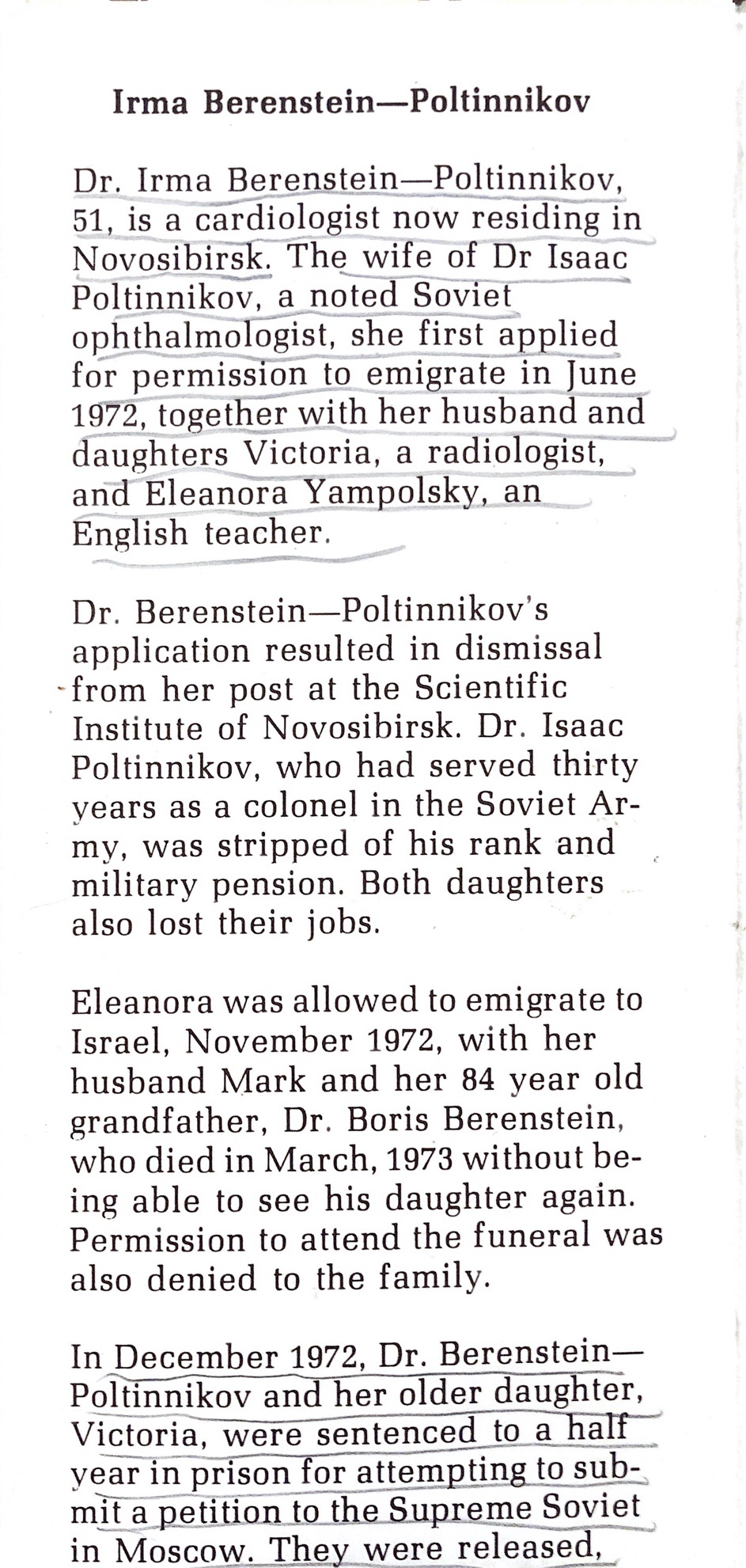
Jewish Telegraphic Agency September 6, 1979
|
This coming December will be the 23rd anniversary of my mother's death. I hope to mark it by sharing a chapter in her life which I knew about, but really only in its outlines. Mom often tried to put flesh on the bones, but 45 years ago, I mostly listened with half an ear. Recently, however, I was working in my attic and opened the trunk in which I placed her papers 21 years ago, as I was cleaning out her last residence. I had avoided opening it over the years, but this time I did- and found a huge file labelled by Mom "Poltinnikov File." I began reading and knew that I should tell the story.
My mother, Freda Zelt, was born in Philadelphia in 1917. She had dreams of becoming a reporter, but her father's death and the Depression put an end to the dream. But one of the qualities of any good reporter-persistence-was always with her and allowed for this story, which is a tale of two intersecting lives, one of whom made history, somewhat forgotten now, and the other who was "just a person" but who made a significant contribution to the other's survival. The first was a Soviet Jew, a "refusenik" named Dr. Isaak Poltinnikov, and the "ordinary person" was my Mom, Freda Zelt.
Mom, though unable to go to college, always pursued Jewish and secular education. She actively supported Jewish causes and became President of her B'nai B'rith Women's chapter and regional chair of the organization's Adult Education program. Beginning in the 1960s and through the 1980s, many Jewish individuals and especially Jewish organizations "adopted" Soviet Jews who had applied for exit visas from the Soviet Union, been denied, and then were subjected to horrible personal and professional recriminations.
I will talk about the larger picture of Soviet Jewry movement in a moment but will note for now that the Oxford BBW Chapter "adopted" the Poltinnikov family of Novosibirsk in Siberia. The family consisted of the parents, Dr. Isaak Poltinnikov, who was a renowned ophthalmologist and Dr. Irma Berenstain-Poltinnikov, a cardiologist and their children Dr. Victoria Poltinnikov, also a physician and a specialist in tuberculosis and Eleonora Poltinnikov, an English teacher and journalist.
What was the Soviet Jewry movement and how did the Poltinnikov family play a role in it?
Many of you remember standing vigil outside of the old Soviet Embassy on 16th Street and participating in various marches designed to bring the plight of the Soviet Jews to the world's attention. What exactly was happening to Soviet Jews?
Most of us know about the treatment of the Jews under the Tsars; many of our families came to this country during the Tsarist regime. After the 1917 Revolution which deposed the last Tsar, the new Soviet regime abolished restrictions on the Jews-but it was a brief respite. While Jewish individuals retained rights, Jewish institutions were repressed. During the Russian Civil War of 1918-21, vicious pogroms broke out which left at least 200,000 Jews dead. In the 1930s, Stalin targeted and murdered Jews until his death in the 1950s. This targeting was continued by the leaders who came after Stalin. Jews lost personal and professional opportunities and of course the practice of Judaism or any other religion was outlawed.
In 1967, an amazing thing happened. The news of Israel's victory in the 1967 War penetrated the Iron Curtain. Soviet Jews arose, mobilized and began to demand civil rights and especially the right to emigrate to Israel. These Jews were dubbed "refuseniks" because their requests for visas were routinely refused. Some famous refuseniks of the period were Ida Nudel and Vladimir Slepak. Our family of refuseniks was not as well-known, probably because of the manner of their protest, but their tragedy certainly ranked as one of the worst.
As Soviet atrocities continued, American Jews mobilized and modeled their movement on 1960s-type civil rights activism. Americans, and Jewish Americans especially, lobbied governments, supported individual refuseniks with cash, goods and religious articles and food and even became "tourists" in order to have clandestine meetings with Jews all over the Soviet Union. Eventually these actions bore fruit- but that is a topic worthy of a full discussion. I'd now like to focus on the tragic story of the Politinnikov family.
Isaak Poltinnikov was nationally known in the Soviet Union for pioneering work in ophthalmology. Dr. Poltinnikov published at least 33 scientific papers. * (list found in papers of Freda Zelt).
He spent his career in the Soviet Army, was chief ophthalmologist of the Red Army medical corps in Siberia and retired as a colonel in 1971.Despite these achievements, Isaak and indeed all of the Poltinnikovs, felt discrimination in their professional lives. This discrimination, coupled with their growing awareness of Israel and their Jewishness, resulted in their individual decisions to apply for emigration permits-which resulted in far worse against them than they could have imagined. Isaak was stripped of his rank and retirement benefits and Irma and Victoria lost their jobs after being abused by fellow workers. Fate intervened for Eleonora, however. Because the Soviets were afraid that the Jackson-Vanik Amendment (restricting trade with countries which limited human rights including emigration) would pass, they sought to show the U.S and the world that they would allow freedom of emigration. Eleonora, along with several thousand other people, boarded a plane for Israel in 1972.
Drs. Irma and Victoria Poltinnikov then tried to present a petition to the authorities in Moscow and were arrested and imprisoned. Irma- who had a weak heart- collapsed; Victoria's previous condition of tuberculosis became active as a result of the imprisonment. Isaak was informed that his status as an ophthalmologist had given him access to "army secrets" and would never be allowed to emigrate. The family that remained (Eleonora had made it Israel) had no income and had sold all of the furniture in their Novosibirsk apartment in order to pay for food.
Desperate, they went on a hunger strike. As their physical conditions worsened, the KGB refused them any medical help unless they publicly renounced their hunger strike. The news got out to the world but no interventions from public figures, including Senator Henry Jackson, brought help. They eventually stopped the strike.
Victoria tried to apply again for the exit permit and was again arrested. After praising Zionism to her interrogators, Victoria was branded an "ideological enemy" who "should be killed." They were all informed that since they weren't working, they would be arrested for parasitism. Of course, the KGB had sent word to all employers that they shouldn't be hired under any circumstances. KGB staff interrupted their communications with the outside world and especially with Eleonora. They confiscated the cash and goods that outside groups- such as my mother's- attempted to get to them. Isaak Poltinnikov was hit by a bus, which could have been an accident but was also a familiar KGB tactic.
Isaak suffered a major heart attack; his heart-specialist wife Irma saw that the hospital was willfully treating him with procedures which were the opposite of what was appropriate. She managed to bring him home.
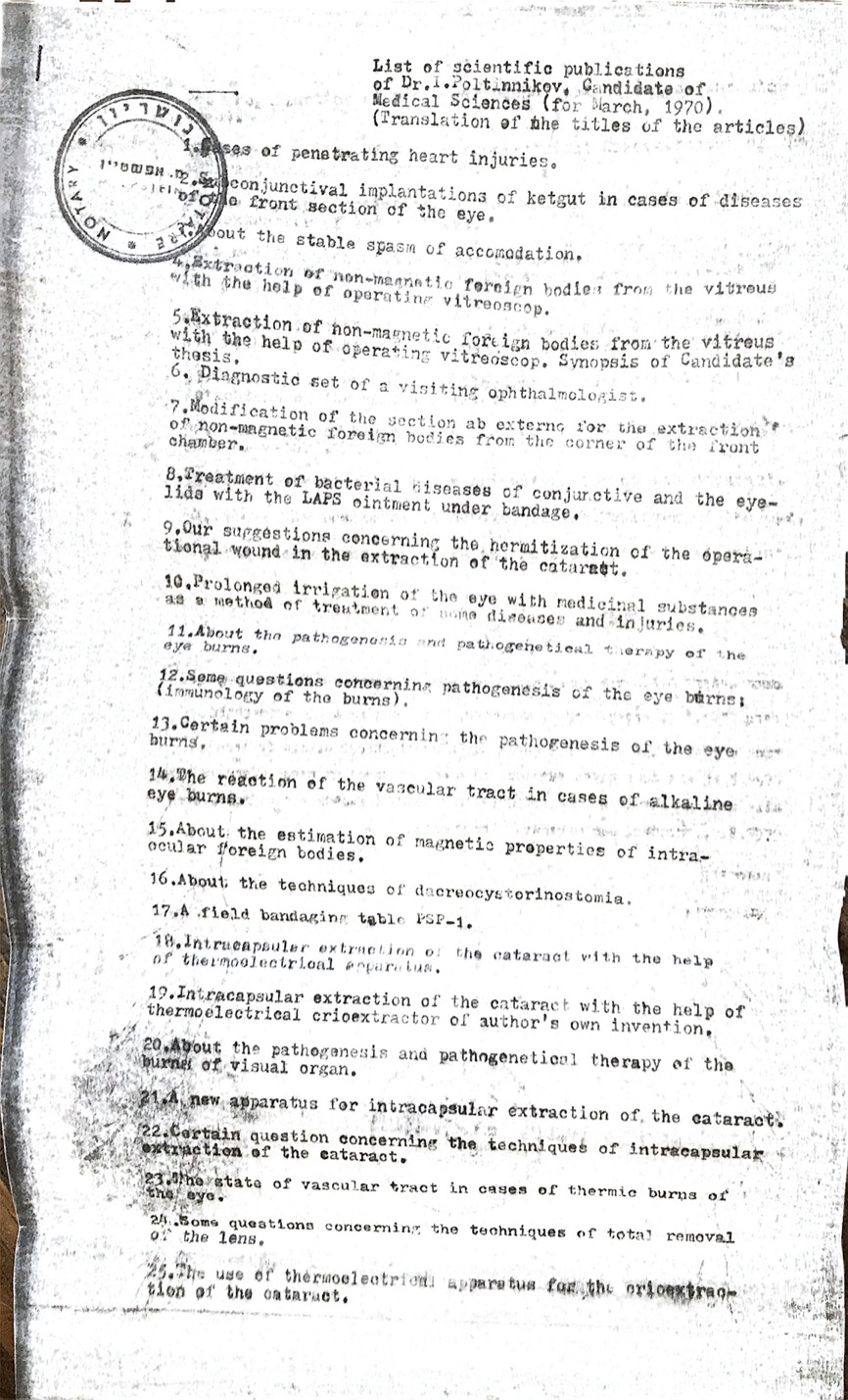
|
At this point, the Poltinnikov family's fear was so great that they barricaded themselves in their apartment, not opening the door even for friends. They would lower a basket with remaining money and ask passers-by to purchase food for them. Again, the world took note and tried to bring pressure on the Soviets. Finally, in January 1979, the Soviets granted the exit permits. Groups all over- including the Oxford Chapter of B'nai B'rith- rejoiced; but the struggle had resulted in the emotional collapse of Irma and Victoria. They were completely convinced that it was another KGB trick and refused to leave the apartment. The groups that had supported them pleaded with them; Isaak could not make them change their minds. The physical and emotional torture had been too much for them. Finally, he decided to go to Israel and send back "proof" that he had arrived and that they could indeed go.
On August 6, 1979, Irma Poltinnikov died of starvation. Victoria, suffering from severe malnutrition, was taken to a hospital. Hospital staff did not observe standard protocol for mental disorders and did not watch her. Unobserved by those who should have been observing her, she left. She went back to the Novosibirsk apartment where she hanged herself.
So how did my mother fit into this horrible story? Obviously, she supported the family and worked for their release, both as an individual and through B'nai B'rith. She contributed to the freedom of Isaak and Eleonora. There were times that I remember when our home in Wheaton was used as a hush-hush "drop zone" for I don't know what in the effort to get financial and political support for the Poltinnikovs.
But Mom's shining role came after the tragedy- in the way that she helped Isaak after he reached Israel- a physically and emotionally broken man. It was a by-product of her own long struggle with an eye disease she had developed as a young mother. It was unable to be controlled and she ultimately lost the eye in middle age. As a result, though, she was intimately familiar with the staff and functioning of Philadelphia's famous Wills Eye Hospital.
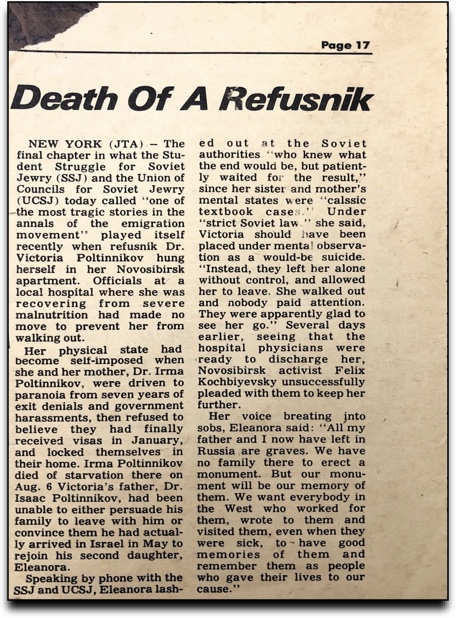
|
She continued to correspond with Isaak. He told her that Israeli government could not accept his medical degree- a man who had published at least 33 research papers because he did not have a copy of that degree and of course, the Soviets were not inclined to furnish him with it. He had to re-qualify with a year's course. He did so. He was then assigned to the Kupat Cholim as an ophthalmologist. Dr.Poltinnikov, suffering from heart disease, couldn't keep up with the patient load demanded by the system. What he wanted and needed was to have a private practice which would allow him to work at his own pace.
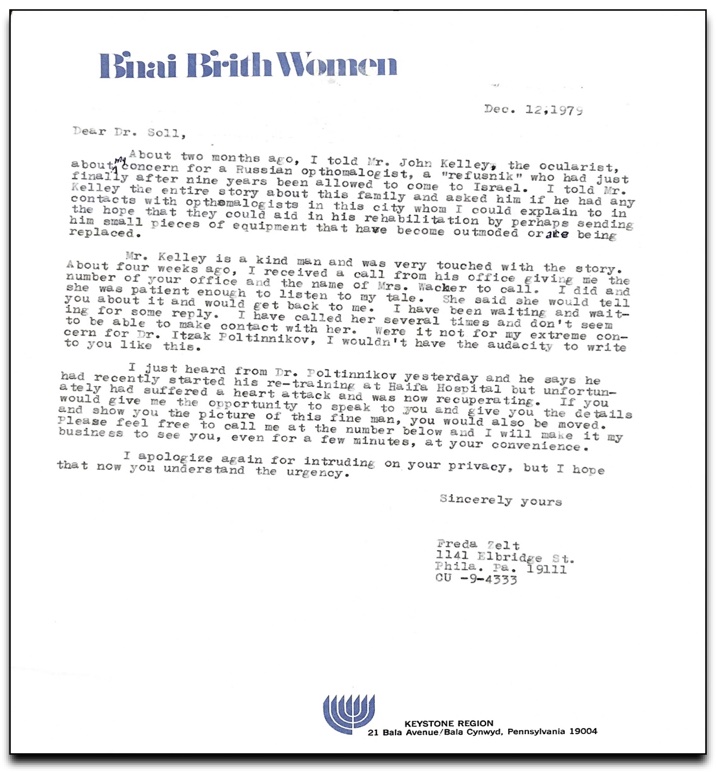
Philadelphia Jewish Exponent
|
The main obstacle was not a lack of skill- quite the opposite. It was lack of instruments. We've all been to ophthalmologists' offices and seen the many, complex and expensive machines needed to diagnose and treat the eye.
Mom, having by this time lost her eye and been fitted with a prosthetic, drew on her knowledge of the various specialists and the institution she had come to know over 25 years. She decided to "see what could be done." While there was compassion and many suggestions, there were no expensive instruments forthcoming.
Then a happy coincidence occurred. The venerable Wills Eye Hospital, housed in a 50-year old building, announced that it was planning to move into a larger, modern facility.
Mom pounced. She opened her meticulously kept phone book and began making calls to everyone she knew at Wills. She informed them- and who knew how she contrived the argument- that it would cost them more to move instruments than to give them to her. And besides, wouldn't they have new, up-to-date equipment in a brand-new hospital?
Wills staff were gracious. Sometimes they chuckled a little. The answer was always "sorry." There were bureaucratic reasons, tax reasons, Board of Directors reasons and all translated to "we'd love to, but it's impossible."
Mom's wannabe reporter's persistence kicked in. Fortunately, there was no caller ID then! She began calling several of the higher-ups at Wills every business day. She was always polite. I got a run-down several times a week.
I will never know how she did it, but the calls continued for close to a year and slowly wore the administrators down. They agreed to turn over tens of thousands of dollars' worth of used equipment to Dr. Poltinnikov. They agreed to pay shipping. And they agreed to dramatically undervalue the equipment on paper so that Dr. Poltinnikov would not have to pay customs and other taxes to the Israeli government.
Dr. Politinnikov received the equipment in 1980 and was able to open a small private office and practice his profession. I met him in 1983 at our son's Bar Mitzvah at the Kotel. Sadly, Dr. Poltinnikov died in Israel in 1986, his health having been severely damaged by the Soviet torment. But for six years, he had the fulfillment of again being professionally recognized.
The positive quality of my mother's persistence and her ability to turn the misfortune of her own illness into an asset brought some light to a man who brought merit to the Jewish people.
May the Poltinnikov family's struggle to be free Jews not be forgotten.
May Freda Zelt's memory be for a blessing.
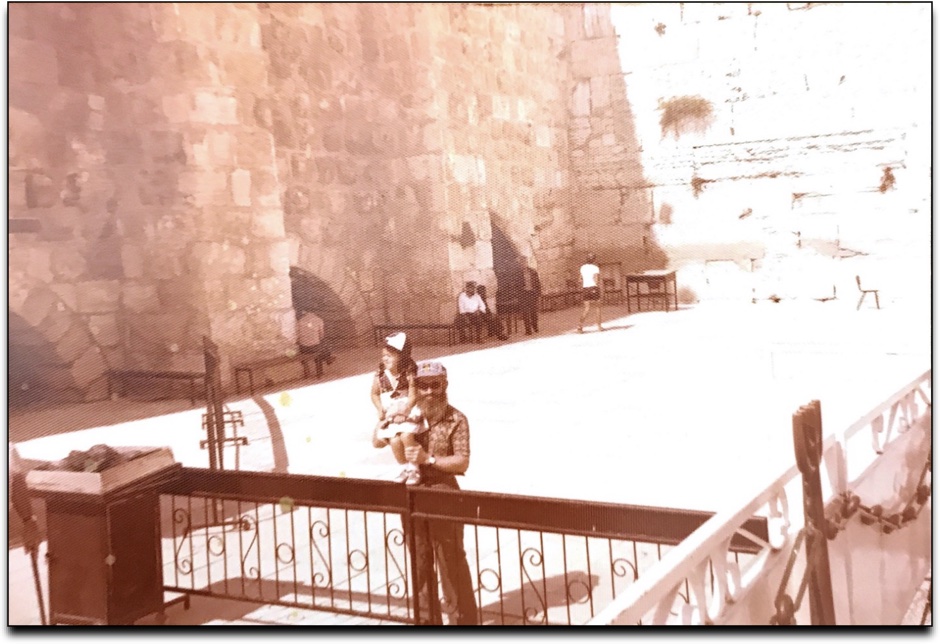
Dr. Isaac Poltinnikov with grandchild Miriam at Kotel, June 5, 1979
|
Compiled from the files of Freda Zelt (1917-2020) and written by daughter Natalie Cantor in April 2020
Silver Spring, Maryland
|